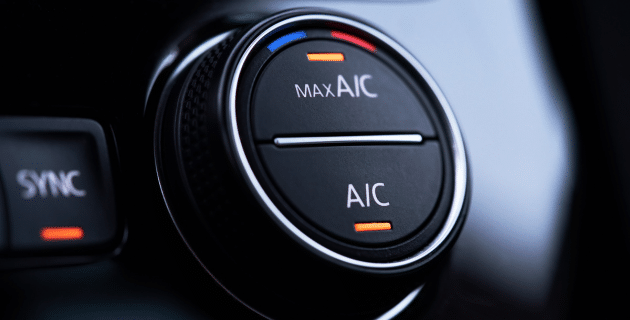Getting into a hot car is the last thing you want to do on a scorching summer day. You want to cool that car down fast. We researched the tried-and-true methods to maximize the cool in your car’s air conditioning system. Read on to find out more.
How air conditioning works in your vehicle
Your car’s air conditioning pulls air in from the cabin or outdoors. It takes out the heat and moisture, and then pushes it through the vents so you feel cool air. Importantly, the air conditioner draws energy from the engine. When you put on the air, your engine must work harder, and you burn more fuel. So, you want to cool down, but you don’t necessarily want to do it by burning more than you need to.
Follow these 6 tips to cool your car quickly and efficiently.
#1: Park in a shady spot.
Give your air conditioner some help by parking in a shady spot. While your car will still be hot, it will be cooler than in the direct sun. That way your air conditioning will start with the air at a relatively lower temperature and have less work to do to bring the temperature down.
Pro Tip: If there is no shady spot, create one with a sunshade. Not only does it help with heat, a sunshade protects the inside of your car from damaging UV rays.
#2: Wait to run the AC.
Roll down the windows and let the warm air escape before you get into the car. Open your door and move it back and forth like a fan, to force some cooler air in and hot air out. Then, wait until the car is in motion to turn on the air conditioning. Precooling without driving can reduce the battery life of an electric or hybrid car. Plus, as you’re moving, the air flow will naturally help the AC run more efficiently. The faster you go, the faster the engine turns, and the faster the compressor runs, resulting in cooler air.
Pro Tip: So that the steering wheel and other components aren’t too hot to touch, try wiping them down with a damp cloth prior to driving. In a pinch, wet wipes can work.
#3: Don’t switch to max right away.
When you first get into the car, it’s usually hotter inside than the air outside. You don’t want to pull in that hot air. Instead, turn on the fan to maximum speed and make sure it’s set to outside mode (not recirculate). Leave the AC button off at first. Once you’ve had a chance to force out some of the humid and hot air, then turn on the AC mode and set it to recirculate. Keep it on the coldest setting until it’s the temperature you want.
Pro Tip: Before you shut off your car, turn the air off. That way it won’t go on automatically when you turn it on again.
#4: Install an AC curtain.
It’s faster to cool a smaller space than a larger one. That’s the idea behind an AC curtain. This fan-powered device creates an invisible barrier that keeps cold air in one section. In a larger SUV or minivan, this could reduce the space that needs to be cooled, and it works well if there are just a couple of occupants.
Pro Tip: Amp up the cool with a cooling seat cover with its own temperature control.
#5: Change your air filters.
Your car’s air filters remove dirt, pollen, and dust from the air. When your cabin filters are clogged, they struggle to get the air through. That’s why it’s important to clean them according to the schedule in your owner’s manual. This is usually every year or two, or every 15,000-20,000 miles.
#6: Keep your car well maintained.
A dirty air condenser impacts the performance of your air conditioning system. Have your condenser cleaned with regular maintenance. If your AC is not working well, check the system. It could be a worn-out part, or too little refrigerant in in the system. Note that adding refrigerant is not a normal task. The system is sealed, and so if refrigerant is low, you could have a leak.
Finally, protect your car with the right insurance for added peace of mind this summer.
Safe travels.
This article is furnished by California Casualty, providing auto and home insurance to educators, law enforcement officers, firefighters, and nurses. Get a quote at 1.866.704.8614 or www.calcas.com.
- California Casualty Earns Financial Stability Rating® of A, Exceptional, From Demotech, Inc. - April 28, 2025
- Music & Arts Grant Recipients – 2024 - December 13, 2024
- Understanding Auto and Home Insurance Rate Changes - December 3, 2024

